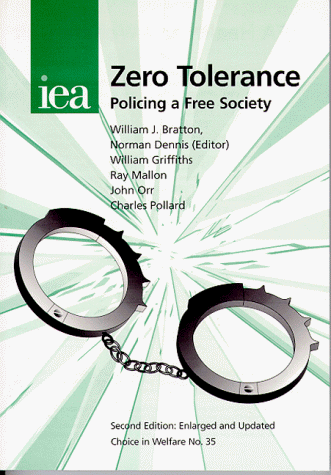Zero Tolerance: Policing a Free Society - Softcover

"synopsis" may belong to another edition of this title.
Police officers have a very specific job to do. They are not and cannot be all-purpose social workers. So far as their legal powers and rules of guidance permit, and public opinion allows, it is to see that people can go about their lawful business within a public environment which has not been gratuitously degraded, in an atmosphere of reasonable give-and-take, and without great anxiety that their homes or cars will have been broken into when they return to them. Not 'clamping down' on minor misdemeanours, if 'clamping down' is the question-begging phrase the Archbishop of Canterbury wants to use, is the certain way of not solving the problem. For not only do you not solve the problem in the form in which it becomes manifest to the public, and in so far as it is controllable by the police. You provide a breeding ground in which the same and worse problems can fester. 'Clamping down'lard shows in this volume, shared assumptions about crime can lead to a variety of policing strategies. 'Neighbourhood policing' in San Diego is not the same as 'community policing' in New York City. 'Confident policing' in Hartlepool is not identical with 'problem-solving policing' in the Thames Valley Constabulary area, nor with intelligence-led policing in London, nor with the Spotlight Initiative in Strathclyde. When the police have done their job, then, as compassionate private citizens, compassionate politicians, compassionate social workers, compassionate clergy, compassionate pressure-groups and compassionate charities, we can do ours. The intention of this volume is not to press a case. Like others in the series, it is to start a discussion which brings open minds to bear on the ascertainable data of a neglected matter of emerging and urgent public concern.
"About this title" may belong to another edition of this title.
- PublisherCivitas:Institute for the Study of Civil Society
- Publication date1997
- ISBN 10 0255364326
- ISBN 13 9780255364324
- BindingPaperback
- Edition number2
- Number of pages159
- EditorDennis Norman
Shipping:
£ 4.80
From United Kingdom to U.S.A.
Top Search Results from the AbeBooks Marketplace
Zero Tolerance: Policing a Free Society
Book Description Paperback. Condition: Good. The book has been read but remains in clean condition. All pages are intact and the cover is intact. Some minor wear to the spine. Seller Inventory # GOR004912405
Zero Tolerance: Policing a Free Society (Choice in welfare)
Book Description Paperback. Condition: Used: Acceptable. Paperback in good condition. Seller Inventory # 24676
Zero Tolerance:Policing a Free Society (Choice in Welfare,No 35)
Book Description Condition: Very Good. Book is in Used-VeryGood condition. Pages and cover are clean and intact. Used items may not include supplementary materials such as CDs or access codes. May show signs of minor shelf wear and contain very limited notes and highlighting. Seller Inventory # 0255364326-2-3
Zero Tolerance: Policing a Free Society
Book Description Condition: Good. This is an ex-library book and may have the usual library/used-book markings inside.This book has soft covers. In good all round condition. Please note the Image in this listing is a stock photo and may not match the covers of the actual item,300grams, ISBN:0255364326. Seller Inventory # 8533598
Zero Tolerance: Policing a Free Society
Book Description Condition: Good. This is an ex-library book and may have the usual library/used-book markings inside.This book has soft covers. Clean from markings. In good all round condition. Please note the Image in this listing is a stock photo and may not match the covers of the actual item,300grams, ISBN:0255364326. Seller Inventory # 9845861
Zero Tolerance: Policing a Free Society Mallon, Ray; Bratton, William J; Orr, John; Pollard, Charles and Dennis, Norman
Book Description Paperback. Condition: Good. Ex library/school book Book is in good condition. Cover has some wear. Discolouration present. Fingermarks present. Sloping spine. Plastic cover present. Seller Inventory # B0185962

